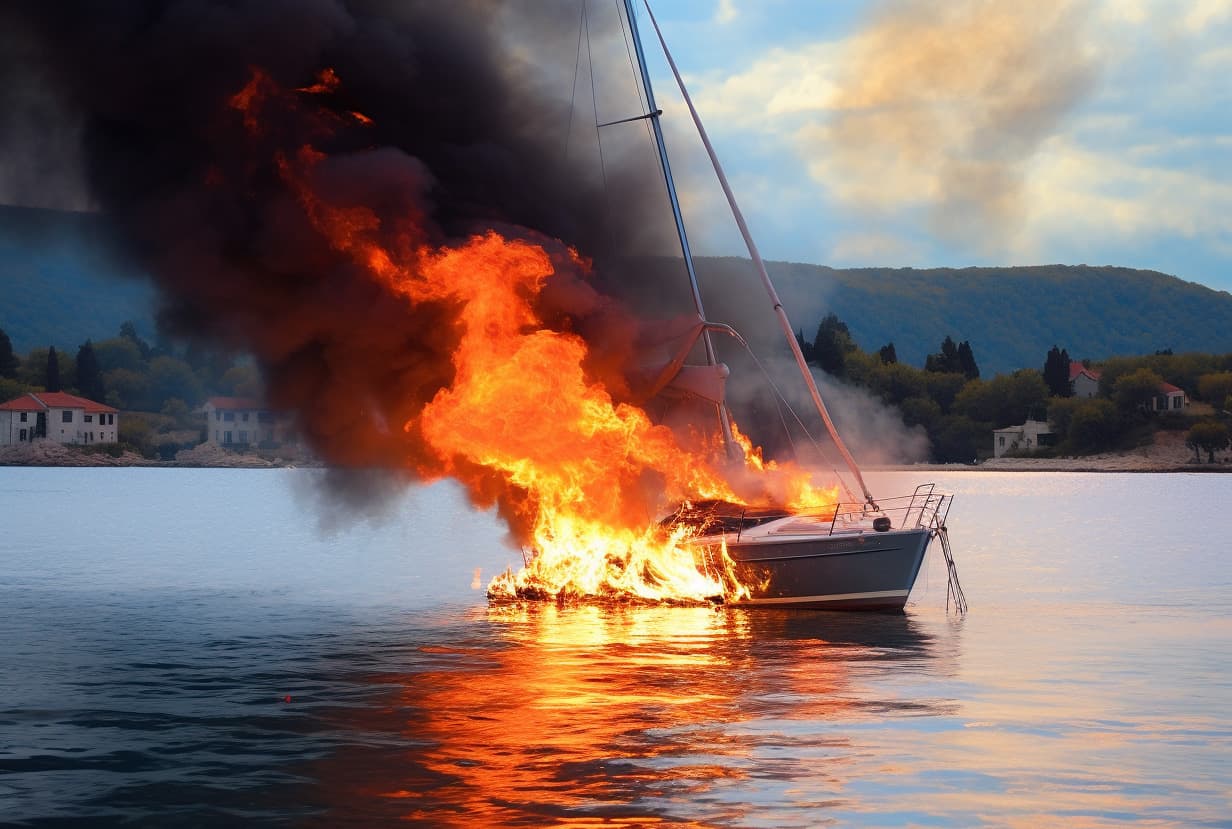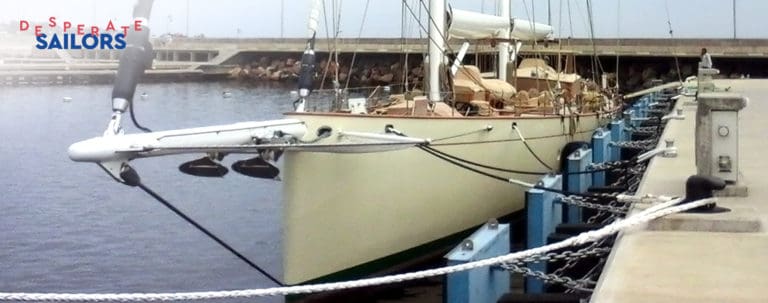Being out on a boat has countless risks associated with it, such as falling overboard, running out of power, getting caught in sudden bad weather, capsizing…the list goes on.
However, one of the lesser thought-about risks associated with boating is that of fire.
I know, I know, it seems odd that fire can occur out in the middle of the sea.
Surely all that water would stop the fire?
However, this is not the case.
A fire in your boat can turn into a very serious and life threatening emergency situation very quickly if it is not dealt with properly.
One of the elements of a boat that can catch fire is the motor.
This is because it is working constantly to keep the boat running and can encounter malfunctions and overheat.
What Should You Do Immediately If A Boat Motor Catches Fire?
If you notice any sign of fire coming from the boat motor, the first thing you should do is stop the boat.
As well as stopping the boat, one of the immediate priorities should be ensuring that every single person aboard the boat immediately puts on a personal floatation device.
This is to ensure that everyone is prepared in case you need to jump overboard to escape the fire.
When the boat has stopped and all of your passengers (and yourself) have their flotation devices on, you should ensure that you make it a priority to position your boat so that the fire is downwind.
This will help to prevent the fire from spreading, and potentially from getting unmanageable.
You should, however, bear in mind that depending on where the fie is, you may need to alter this.
For example, if your fire is in the front of your boat then you should put the stern of the boat facing the wind.
If the fire has occurred at the back of the boat then you should head into the wind.
Keep in mind that you may need to use a paddle to do this if the engine is off.
If your motor happens to be located in the engine space you should also ensure that you shut off the fuel supply.
This will ensure that the fuel cannot add to the fire and worsen it.
Even if your motor is not near the fuel, it may still be a good idea to shut off this fuel supply for now, just in case the fire spreads.
It is vital that you ensure there is a fire extinguisher aboard your boat, even if you think you will never use it.
Clearly, if your boat motor catches fire, you will be grateful that you put an extinguisher on board.
In this case, you should directly aim your fire extinguisher at the boat motor, ensuring it hits the bottom of the flames completely.
When you are using it, aim to apply it in a sweeping motion, going back and forth over the flames.
If the fire in question is small, then this should be enough.
However, if it has already spread, you need to prepare yourself for the fact that the extinguisher may not be able to put it all out.
You should never try to put the fire out with water or clothes, especially if the fire is a fuel related fire, electrical fire, oil fire, or grease fire.
Only use a fire extinguisher.
As soon as you feel you have the fire under control (or if you begin to feel it is unmanageable) you should call for help using your radio.
Ensure to describe your boat, give as much detail on your location as possible, and let them know how many passengers you have on board.
You may feel that the safest option is to jump overboard.
If you do decide to do this then you should bear in mind that you should only do it as a last resort and you feel you are very unsafe onboard the boat.
Before you do this you should inform someone via your VHF marine radio so that they can communicate that to the rescue service that will come for you.
Try and get as far away from the boat as possible in case it explodes.
If you are within safe swimming distance from dry land, you can attempt to get there.
Make it a priority to get all young children and non-swimmers to safety first.
Keep in mind that a fire on a boat may seem like it can be easily solved by simply flooding the fire.
A fire on the boat motor could, in theory, be put out via flooding.
However, you also run a number of risks if you do this.
For example, if the motor runs on fuel or electricity, water can make it much worse, turning the situation deadly very quickly.
You could potentially make the fire worse, cause electrical issues, and more.
As well as this, flooding any part of the boat puts you at risk of flooding the whole boat which could potentially make your situation worse.
In contrast, if you were to use a fire extinguisher, you may be able to put the fire out quickly and still have a boat that is safe to wait in until the rescuers come and assist you further (see what to do if the fire breaks out at the front of your boat).
Clearly, the most important thing is to keep calm and act quickly.
Do not make stupid decisions in haste that could potentially cause the situation to deteriorate even further.
Follow our advice carefully and ensure that you have all of the necessary safety equipment before you embark on every single boating journey.
This includes ensuring that all of your passengers have a personal floatation device that fits correctly.
You also need to ensure that you have at least one fire extinguisher onboard your boat before you set off.
It is also a good idea to ensure your boat is in good working order before you take it out by performing a quick MOT or check yourself.
Never miss appointments to get your boat checked and repair damages as they arise.




